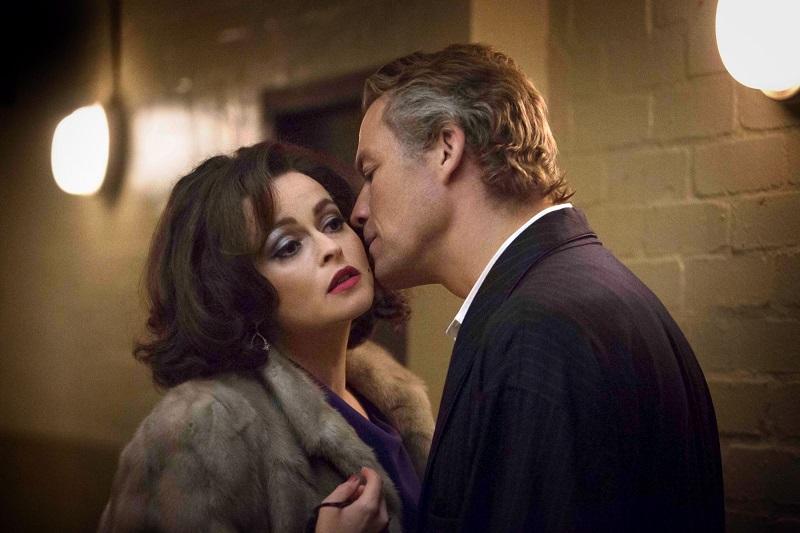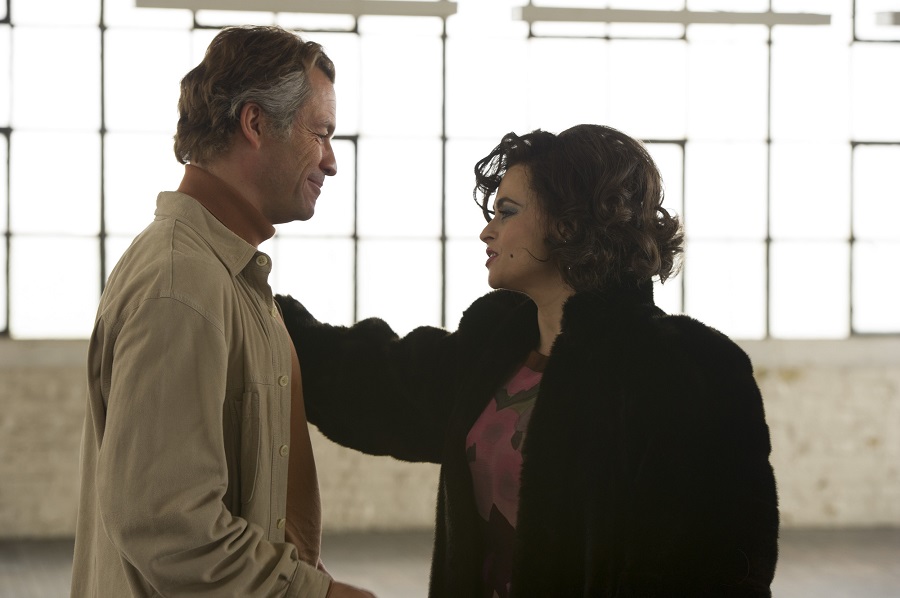Burton and Taylor, BBC Four | reviews, news & interviews
Burton and Taylor, BBC Four
Burton and Taylor, BBC Four
Channel's dramas about the private lives of the famous end with a touching valediction

They’ve served BBC Four well, these dramas about the private lives of the stars. From writers to comics, presenters to chefs, the secret traumas of yesteryear’s celebs have entertained and enlightened. And, if we’re honest, embellished. Now that the channel has given up making drama, viewers will have to get their scripted gossip from alternative sources. In Burton and Taylor, the run concluded by peeping through the curtain at two of the most public private lives of all.
William Ivory’s script dropped in on the famous romance long after its embers had officially flickered out. This was 1983, when “You Make Me Feel Mighty Real” was luring Elizabeth Taylor onto the disco dancefloor, and she and Richard Burton had not seen in each other in years, their second marriage long since annulled. They regrouped in New York to put on a production of – guess what? - Private Lives. “I must have his number somewhere,” drawled Taylor at the press conference.
The plan was to rake it in – they needed the money – but they both brought excess baggage. Burton was dating a much younger woman and finally off the sauce, while Taylor was married to someone or other and addicted to pills and booze. Oh, and although as producer she was officially Burton’s boss, at first rehearsals it emerged she hadn’t actually read the play.
 Hark what discord followed. Naturally, the audience had come to see life played out as art – a play about divorcees who can’t live with or without each other. As the bickering escalated, each slight stimulated a vengeful counter-slight. He gave her a note about playing to the gallery, she sent him on with an understudy and emptied the houses, he slipped off to Vegas to get hitched, she sashayed onstage with her pet parrot. And throughout, another great play kept gate-crashing the through-line. Burton’s ambition to play Lear found him staring into the mirror and wistfully reciting lines about infirmity.
Hark what discord followed. Naturally, the audience had come to see life played out as art – a play about divorcees who can’t live with or without each other. As the bickering escalated, each slight stimulated a vengeful counter-slight. He gave her a note about playing to the gallery, she sent him on with an understudy and emptied the houses, he slipped off to Vegas to get hitched, she sashayed onstage with her pet parrot. And throughout, another great play kept gate-crashing the through-line. Burton’s ambition to play Lear found him staring into the mirror and wistfully reciting lines about infirmity.
The actors’ dilemma for all these made-up real-life biodramas is how slavishly to imitate. Dominic West and Helena Bonham Carter (pictured above) went for impressionistic semi-impersonation. With his hulking, long-limbed gait and her eye swivels and trademark moues, it was never quite possible to ditch the knowledge that these were famous actors playing famous actors. West looked nothing like weary and wizened enough. And yet they beautifully embodied the idea of grand thespians whose ultimate addiction was to each other.
This was encapsulated finally in a touching valedictory scene which had the authentic ring of pure invention. Other touches felt grounded in truth – her dread gift for manipulation and self-pity, his simmering wrath and Welsh tendency to gloom. And a full ration of saltiness was in there too. Burton admired Taylor’s “mind of a collier”, kept a weather eye on her breasts and dismissed his celebrated voice as “the theatrical equivalent of a big cock”. Romantic hokum and good dirty fun, Burton and Taylor was directed with a splendid eye for seediness and glamour by Richard Laxton. Within a year Taylor became the first celebrity openly to book in to the Betty Ford clinic, and Burton was dead.
Add comment
The future of Arts Journalism
You can stop theartsdesk.com closing!
We urgently need financing to survive. Our fundraising drive has thus far raised £49,000 but we need to reach £100,000 or we will be forced to close. Please contribute here: https://gofund.me/c3f6033d
And if you can forward this information to anyone who might assist, we’d be grateful.

Subscribe to theartsdesk.com
Thank you for continuing to read our work on theartsdesk.com. For unlimited access to every article in its entirety, including our archive of more than 15,000 pieces, we're asking for £5 per month or £40 per year. We feel it's a very good deal, and hope you do too.
To take a subscription now simply click here.
And if you're looking for that extra gift for a friend or family member, why not treat them to a theartsdesk.com gift subscription?
more TV
 Murder Before Evensong, Acorn TV review - death comes to the picturesque village of Champton
The Rev Richard Coles's sleuthing cleric hits the screen
Murder Before Evensong, Acorn TV review - death comes to the picturesque village of Champton
The Rev Richard Coles's sleuthing cleric hits the screen
 Black Rabbit, Netflix review - grime and punishment in New York City
Jude Law and Jason Bateman tread the thin line between love and hate
Black Rabbit, Netflix review - grime and punishment in New York City
Jude Law and Jason Bateman tread the thin line between love and hate
 The Hack, ITV review - plodding anatomy of twin UK scandals
Jack Thorne's skill can't disguise the bagginess of his double-headed material
The Hack, ITV review - plodding anatomy of twin UK scandals
Jack Thorne's skill can't disguise the bagginess of his double-headed material
 Slow Horses, Series 5, Apple TV+ review - terror, trauma and impeccable comic timing
Jackson Lamb's band of MI5 misfits continues to fascinate and amuse
Slow Horses, Series 5, Apple TV+ review - terror, trauma and impeccable comic timing
Jackson Lamb's band of MI5 misfits continues to fascinate and amuse
 Coldwater, ITV1 review - horror and black comedy in the Highlands
Superb cast lights up David Ireland's cunning thriller
Coldwater, ITV1 review - horror and black comedy in the Highlands
Superb cast lights up David Ireland's cunning thriller
 Blu-ray: The Sweeney - Series One
Influential and entertaining 1970s police drama, handsomely restored
Blu-ray: The Sweeney - Series One
Influential and entertaining 1970s police drama, handsomely restored
 I Fought the Law, ITVX review - how an 800-year-old law was challenged and changed
Sheridan Smith's raw performance dominates ITV's new docudrama about injustice
I Fought the Law, ITVX review - how an 800-year-old law was challenged and changed
Sheridan Smith's raw performance dominates ITV's new docudrama about injustice
 The Paper, Sky Max review - a spinoff of the US Office worth waiting 20 years for
Perfectly judged recycling of the original's key elements, with a star turn at its heart
The Paper, Sky Max review - a spinoff of the US Office worth waiting 20 years for
Perfectly judged recycling of the original's key elements, with a star turn at its heart
 The Guest, BBC One review - be careful what you wish for
A terrific Eve Myles stars in addictive Welsh mystery
The Guest, BBC One review - be careful what you wish for
A terrific Eve Myles stars in addictive Welsh mystery
 theartsdesk Q&A: Suranne Jones on 'Hostage', power pants and politics
The star and producer talks about taking on the role of Prime Minister, wearing high heels and living in the public eye
theartsdesk Q&A: Suranne Jones on 'Hostage', power pants and politics
The star and producer talks about taking on the role of Prime Minister, wearing high heels and living in the public eye
 King & Conqueror, BBC One review - not many kicks in 1066
Turgid medieval drama leaves viewers in the dark
King & Conqueror, BBC One review - not many kicks in 1066
Turgid medieval drama leaves viewers in the dark
 Hostage, Netflix review - entente not-too-cordiale
Suranne Jones and Julie Delpy cross swords in confused political drama
Hostage, Netflix review - entente not-too-cordiale
Suranne Jones and Julie Delpy cross swords in confused political drama

Comments
A clever pithy and witty
Welsh tendency to gloom?